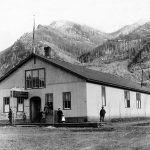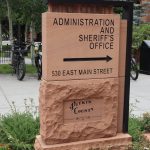Aspen launches survey to enhance city accessibility

Skyler Stark-Ragsdale/The Aspen Times
The city of Aspen is focused on improving accessibility for individuals with disabilities in line with the Americans with Disabilities Act and has launched a new comprehensive ADA self-evaluation this month to assess facilities, programs, and public rights-of-way.
The ADA was originally enacted on July 26, 1990, and was later amended effective Jan. 1, 2009, to protect the rights of individuals with disabilities, according to an Aspen press release. Title II of the ADA prohibits state and local governments from discriminating against individuals based on disability or denying access to programs, services, or activities.
“To comply with Title II, local governments are required to develop transition plans that identify physical barriers within public facilities and establish a roadmap for improving accessibility to buildings and services,” the release reads. “The first step of this process is to complete an ADA self-evaluation, a comprehensive review of an agency to identify barriers for individuals with disabilities.”
The city’s self-evaluation began in August 2024 and is anticipated to continue through January 2028 until the transition plan is completed. According to a Public Rights-of-Way ADA Curb Ramp and Transit Stop Summary of Findings from December 2024, the city has already assessed 413 curb ramps and 30 transit stops for accessibility, estimating that the preliminary cost for barrier removal for curb ramps, transit stops, and curb cuts would be around $1,949,850 total.
The Summary of Findings also cited the Center for Disease Control’s estimate that, as of 2018, 26% or 1 in 4 adults has a disability that impacts major life activities such as walking and climbing stairs (13.7%), independent living (6.8%), difficultly hearing (5.9%), and vision difficulty (4.6%). The document notes these percentages are also likely underreported and do not account for people experiencing temporary disabilities.
The continued self-evaluation process is a collaborative effort being led by the city’s engineering department.
“The city is actively seeking input from residents to help identify barriers and prioritize future improvements,” the release states. “Community perspectives will directly inform the development of an ADA self-evaluation summary of findings report, which will be made available to the public upon completion of the assessment.”
Aspen residents are being asked to complete a voluntary five-minute survey. Topics of the survey include sidewalks, curb ramps, signalized intersections, on-street accessible parking, transit stops, city buildings, accessible communications, and public meeting accessibility.
All survey responses are confidential. The feedback will be used toward the city’s efforts to prioritize ADA improvements and continue enhancing access. To provide feedback through the survey, go to survey123.arcgis.com/share/9068532a666647708624dd48f1758928.
Aspen launches survey to enhance city accessibility
The city of Aspen is focused on improving accessibility for individuals with disabilities in line with the Americans with Disabilities Act, and has launched a new comprehensive ADA self-evaluation to assess facilities, programs, and public rights-of-way.










